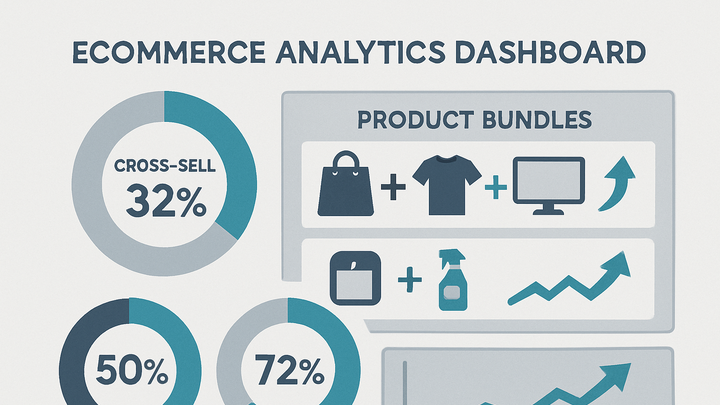Published on 2025-06-22T07:19:23Z
What Is Cross-Sell Rate? Definition & Examples
Cross-sell rate measures the percentage of transactions in which customers purchase a secondary product or service alongside their primary purchase. It’s a key metric in analytics and ecommerce, reflecting how effectively a business encourages existing customers to add complementary items.
A healthy cross-sell rate indicates not only increased revenue per customer but also stronger customer engagement and satisfaction. Companies track cross-sell rate over time to identify upselling opportunities, refine marketing strategies, and improve product bundles.
With tools like PlainSignal and GA4, teams can implement event-based tracking to capture cross-sell events in real time. By analyzing cross-sell data, businesses can make data-driven decisions to optimize product pairings, personalize offers, and drive sustained growth.
Cross-sell rate
Percentage of orders with added secondary products, measuring how well complementary sales perform.
Why Cross-Sell Rate Matters
Cross-sell rate reveals how successfully a business leverages existing customer relationships to boost revenue and deepen engagement.
-
Increase average order value
By adding complementary products, each transaction brings higher value, improving overall revenue per order.
-
Enhance customer satisfaction
Relevant add-ons can solve additional customer needs, leading to better experiences and higher loyalty.
-
Optimize marketing strategies
Tracking cross-sell rate informs which product pairings resonate, guiding targeted promotions and bundle offers.
How to Calculate Cross-Sell Rate
A clear formula helps teams quantify cross-selling effectiveness and benchmark performance over time.
-
Basic formula
Cross-Sell Rate = (Number of Orders with Cross-Sold Items ÷ Total Number of Orders) × 100
-
Variables explained
Breakdown of each component in the formula:
-
Orders with cross-sold items
Total transactions where at least one complementary product was added.
-
Total number of orders
Overall transactions in the same period, regardless of add-ons.
-
Tracking Cross-Sell Rate with Analytics Tools
Implement event-based tracking in your analytics platform to automatically record cross-sell events for real-time insights.
-
PlainSignal
PlainSignal is a cookie-free analytics tool that respects privacy and can track custom events like cross-sells. To set up cross-sell tracking, include the PlainSignal script and send a custom event when a cross-sell occurs.
-
Integration snippet
<link rel="preconnect" href="//eu.plainsignal.com/" crossorigin /> <script defer data-do="yourwebsitedomain.com" data-id="0GQV1xmtzQQ" data-api="//eu.plainsignal.com" src="//cdn.plainsignal.com/plainsignal-min.js"></script> -
Event tracking example
PlainSignal.track('cross_sell', { order_id: '12345', items: ['productA', 'add_onB'] });
-
-
Google analytics 4 (GA4)
GA4 allows you to log custom events to measure cross-sell performance. Use the gtag function or Google Tag Manager to push an event whenever a cross-sell happens.
-
Basic setup
<script async src="https://www.googletagmanager.com/gtag/js?id=G-XXXXXXXXXX"></script> <script> window.dataLayer = window.dataLayer || []; function gtag(){dataLayer.push(arguments);} gtag('js', new Date()); gtag('config', 'G-XXXXXXXXXX'); </script> -
Event tracking example
gtag('event', 'cross_sell', { currency: 'USD', value: 120.00, items: [ { item_id: '123', item_name: 'SaaS Add-on', price: 20.00 } ] });
-
Strategies to Improve Cross-Sell Rate
Apply proven tactics to encourage customers to add complementary products and maximize each transaction.
-
Understand customer needs
Analyze purchase history and behavior to recommend relevant add-ons that complement the primary product.
-
Bundle products strategically
Create attractive package deals that offer value compared to buying items separately.
-
Personalize recommendations
Leverage customer data and machine learning to suggest the most relevant cross-sell items in real time.
-
Offer time-limited incentives
Use discounts or free shipping on add-ons to create urgency and boost cross-sell conversions.
